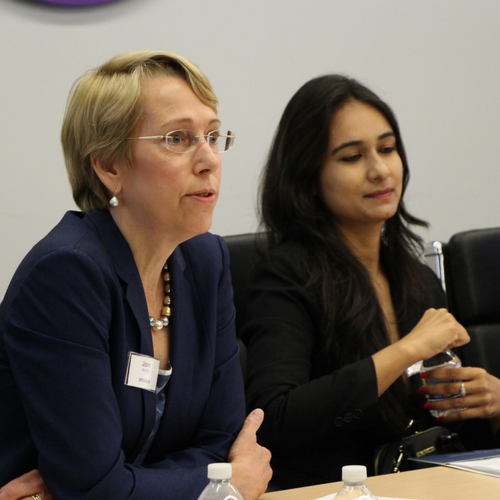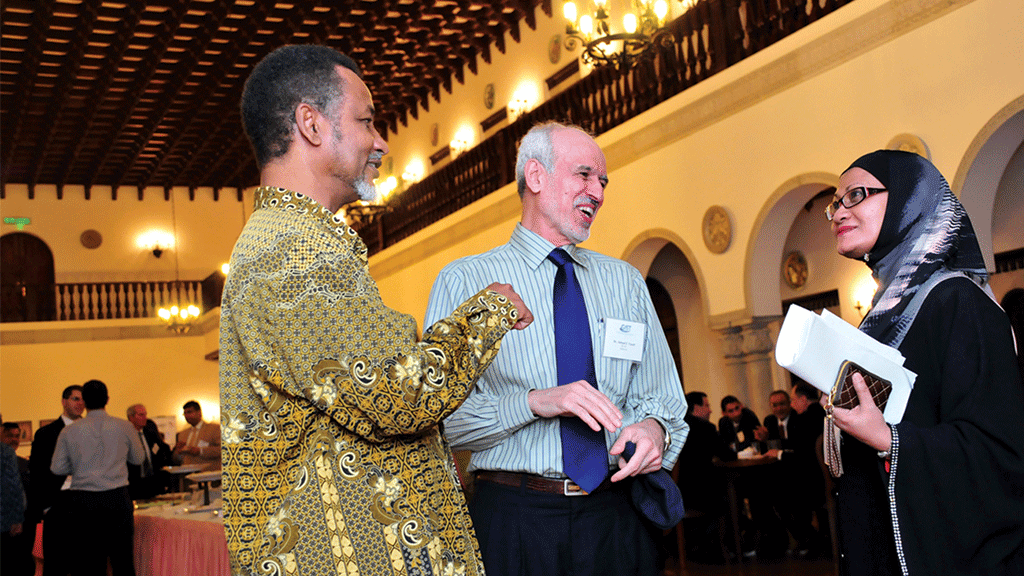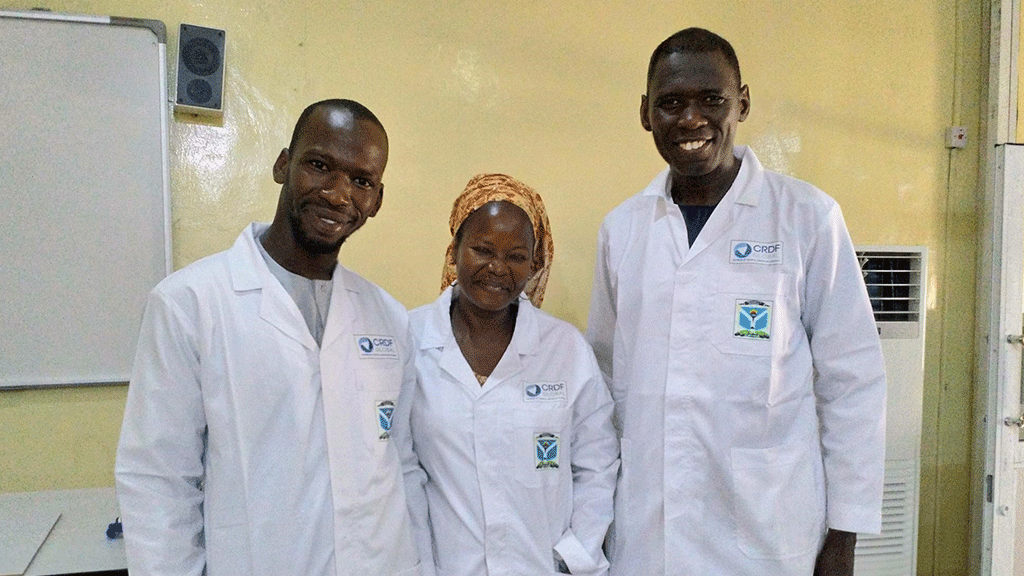Breaking Barriers: Women in Nuclear Security

Breaking Barriers: Women in Nuclear SecurityMeeting NotesJuly 13, 2017 – 8:30AM to 10:30AMCRDF Global – Arlington, VA
SpeakersJoan Rohlfing (President and Chief Operating Officer, NTI)Urvashi Rathore (2017 RCMF Fellow)Kathy Crandall Robinson (Senior Fellow, WIIS)Paul Longsworth (Vice President, Fluor Corporation)
Moderated bySusan King (Director, Nuclear Security, CRDF Global)
SummaryAround the world, including in the United States, women are underrepresented in the field of nonproliferation and nuclear security. In many cases, they face the headwinds of social expectations concerning the role of women, if not also access barriers to education and jobs. Those that establish a career work as a minority in a job sector still dominated by men.
Women in Nuclear Security, the latest event in CRDF Global’s Breaking Barriers series, highlighted the contributions of women to nonproliferation and nuclear security and the value of diversity in the public and private sectors. The panelists and over 60 participants working in government, NGOs, think tanks, academia, and private industry reflected on the challenges they saw to increasing the representation of women domestically and internationally as well as initiatives to mobilize the next generation of women leaders.
Barriers to OvercomeAs we think about women’s participation in the nuclear security field, we need to consider the broader picture. Women are entering the workforce in greater and greater numbers. Despite improvements over the last 40 years, the National Science Foundation found that women remain underrepresented in science, technology, engineering, and mathematics (STEM) fields even though they account for half of the college educated workforce in the United States. For example, women make up only 35 percent of chemists, 21 percent of nuclear engineers, and 11 percent of physicists and astronomers. In the international security arena, women comprise less than 30% of senior leadership positions.
Participants at the meeting shared their perspectives on the challenges to increasing the representation of women in the field of nonproliferation and nuclear security. At the most basic level, more needs to be done to acknowledge the contributions women have made to these fields throughout history. Early career professional women need positive female role models. This can be challenging in traditionally male dominant establishments such as the Department of Defense or the national security arena. For a profession that has traditionally placed high value on technical expertise, encouraging greater enrollment in STEM education may improve women’s representation in leadership positions.
It is vitally important to credit and value the contributions of women in nuclear security. Their work can go unrecognized or be published under a male author’s name. Just some of the women participants wanted to recognize were Rose Gottemoeller, Madelyn Creedon, Hon. Ellen Tauscher, Rep. Loretta Sanchez, Robin Copeland, Ambassador Laura Holgate, Alice Slater, Susan Rice, and Randall Forsberg. Women leaders and women-led organizations were also influential in social movements such as Women’s Strike for Peace, Women’s Action for New Directions, and the Women’s March and Rally to Ban the Bomb.
The discussion also addressed issues such as “imposter syndrome,” where even highly talented individuals are beset with a persistent inner fear that they do not belong at the decision table. These feelings are reinforced when female voices in the workplace are overlooked or only receive attention when repeated back by a male colleague. As reported in a blog post by Meaghan Webster, communication manager at the Nuclear Threat Initiative, Joan Rohlfing suggested women seek out supportive female peers and mentors “who will provide positive feedback when it’s deserved.” Another panelist, Paul Longsworth, “compared overcoming the feeling to running cross-country, ‘If you push your body, you’ll be amazed at what you can do. Your professional life should be the same.’”
Creating a Culture of DiversityParticipants underscored the value of diversity in the workplace. It allows decision makers to consider a broader range of perspectives and ideas, which lead to better solutions. Diversity breeds creativity and results in a workforce that can innovate and adapt quickly to a changing world. Furthermore, 85 percent of global companies surveyed with at least $500 million in annual revenue agreed that diversity is crucial to fostering innovation in the workplace. Military units with greater gender diversity perform better on the battlefield, due to more creative approaches to problem solving, according to a recent Center for New American Security report. Recruitment and retention strategies that recognize this can also add depth to talent pools, which furthers the business case for organizations adopting approaches that value diversity.
A Path ForwardSo how do we square this circle? How can we bring about the change we seek where men and women equally contribute to solving pressing international security concerns, and nuclear security in particular? What can we as employers and hiring managers do to ensure diversity in the workplace? What advice can we provide to women entering this field to set them up for success and retain them? What resources, programs, and professional associations exist to narrow the gender gap in security-related professions in the United States and abroad?
To make progress on these questions, the panelists and audience members shared information on initiatives that are already underway and offered ideas for future initiatives:
Mentorship Programs: Panelists highlighted the value of mentorship programs for women early in their careers. Regular consultations with female (and male) mentors can help women navigate challenging work situations and provide meaningful opportunities for growth.
Amplify Women’s Voices: Joan Rohlfing touted an approach used by female White House staff that strove to amplify the expert opinions expressed by their female peers in meetings. When a colleague’s keen viewpoint was cursorily overlooked – or even coopted by another in the room – they would draw attention back to the original speaker to recognize their contribution to the discussion.
Panel Parity: This initiative pushed by the United Nation’s International Gender Champions Movement calls upon panelists and event organizers to pledge to include women (or in the case of ‘women’s issues’ panels, men) or equal numbers of women and men on discussion panels.
Fellowship Programs: Panelists noted the value of fellowships for women such as the Robin Copeland Memorial Fellowship at CRDF Global. The 2017 recipient, Urvashi Rathore, called the opportunity a “turning point” in her life that gives her a chance to succeed in her career and inspires her to serve as a role model for women in India working in a traditionally male dominated field.
Flexible Workplace Schedules: As long as women remain more likely to be the primary caregiver in a household, employers should integrate flexible work schedules in their workplace that allow women to meet the demands of their job as well as those at home.
Elementary School STEM Outreach: Paul Longsworth saw recruiting more women into STEM careers as a pipeline that starts as early as 3rd or 4th grade when students begin to demonstrate an interest in science.
Networking and Professional Organizations: Kathy Crandall Robinson urged women starting their careers to join groups such as Women in Nuclear and Women in International Security to network with their peers and women role models as well as to learn about resources available to young women in the field.
Balanced Hiring Practices: Hiring managers should consider posting positions to women’s professional associations to reach more diverse audiences and encourage female applicants to apply.
Next StepsIncremental steps such as promoting gender diversity on panels, striving for a balanced workforce and leadership structure, amplifying each other’s voices in the workplace, and offering to mentor women early in their career are all within our reach. CRDF Global looks forward to advancing women’s representation in security fields in partnership with other organizations through both formal and informal initiatives. We are developing a strategy to further promote women in security fields. We look forward to working with many of you to develop this initiative.
We hope to see you at CRDF Global’s 4th Annual Breaking Barriers event to celebrate women in science on International Women’s Day March 8, 2018. For more information on how to support the Robine Copeland Memorial Fellowship, please visit www.razoo.com/story/Robin-Copeland-Memorial-Fellowship
Download a PDF of this report



